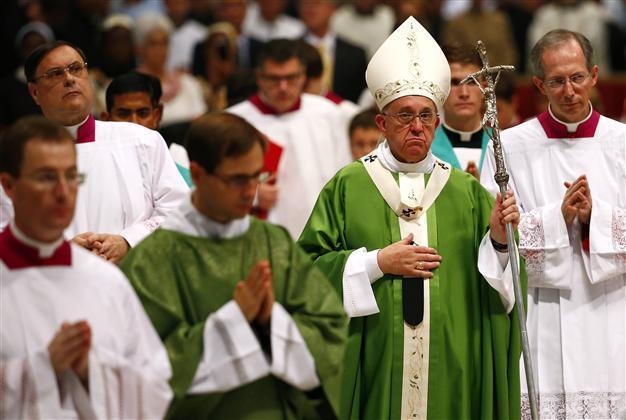Pope launches historic review of teaching on family, marriage
VATICAN CITY - Agence France-Presse

Pope Francis leaves at the end of a mass to mark the opening of the synod on the family in Saint Peter's Square at the Vatican October 5, 2014. REUTERS Photo
Pope Francis on Oct. 5 launched a major review of Catholic teaching on the family that could lead to change in the Church's attitude to marriage, cohabitation and divorce.
An extraordinary synod, or meeting, of nearly 200 bishops from around the world and a sprinkling of lay people will, for the next two weeks, address the huge gulf between what the Church currently says on these issues and what tens of millions of believers actually do.
In his trademark style, the 77-year-old Argentinian pontiff took to Twitter to mark the start of a debate which has pitted conservative clerics against reformists led by German cardinal Walter Kasper.
"As we begin the Synod on the Family, let us ask the Lord to show us the way forward. #prayforsynod," he tweeted shortly before presiding over mass in St Peter's basilica.
In an address to tens of thousands of believers on the eve of the synod opening, Francis urged participants to "lend an ear to the rhythm of our time" and to soak themselves in the "odour" of modern life.
Since becoming pontiff just over 18 months ago, Francis has repeatedly highlighted the "wounds" caused by family breakdown in modern society, while suggesting the Church needs to adapt to this new reality.
"The wounds have to be treated with mercy. The Church is a mother, not a customs office, coldly checking who is within the rules," he has said, in an allusion to the many divorced people, cohabiting couples and single mothers within the ranks of the Church.
Francis has underlined where he stands by personally marrying couples who had lived together "in sin" prior to their weddings and by baptising a child born to parents married outside of the church.
Since taking office, Francis has taken steps to overhaul the way the Vatican bank and administration are run and has sent out strong signals about the determination of the Church to deal with the issue of clerical sex abuse.
But a reform agenda on social issues could prove much harder to implement because of deep divisions within the Church, Vatican experts say.
Conservatives in the Church hierarchy have already made it clear they will fight any dilution of traditional doctrine.
The Church's view of marriage has come to be seen as outdated by many in a world where, in some developed countries, nearly one in two marriages ends in divorce and where the notion of the institution itself has been challenged by the global trend towards the legalisation of same-sex weddings.
The bishops gathered in Rome are certainly not about to embrace gay marriage, and few Vatican observers expect much, if any, change on questions such as contraception, another area where Catholic teaching contrasts with the daily practice of millions.
But with Francis on the side of reform, the feeling is that the synod process could lead to change when it finally reaches conclusions, which is not expected to happen before 2016 at the earliest.
The most notable of these could be a change in the rules to make it possible for Catholics who divorce and then remarry to receive communion.
That has been banned for centuries but critics say the Church's stance is hard to defend given that individuals who have declared their repentance from more serious breaches of the Christian code, such as murder, can take communion.
While the Church may not yet be ready to take a step that would amount to a de facto acceptance of divorce in certain circumstances, the discussions could result in steps to make it easier for failed marriages to be annulled.
Another area in which the Church could send out a signal of compassion is by making it clear that priests should be ready to baptise the children of same sex couples, regardless of the doctrinal disapproval of their parents' union.
The synod will also discuss how priests and parishioners can practically help to shore up marriages within their community. Among questions to be addressed on that score is whether the easy availability of pornography in modern society is a factor in family breakdown.
